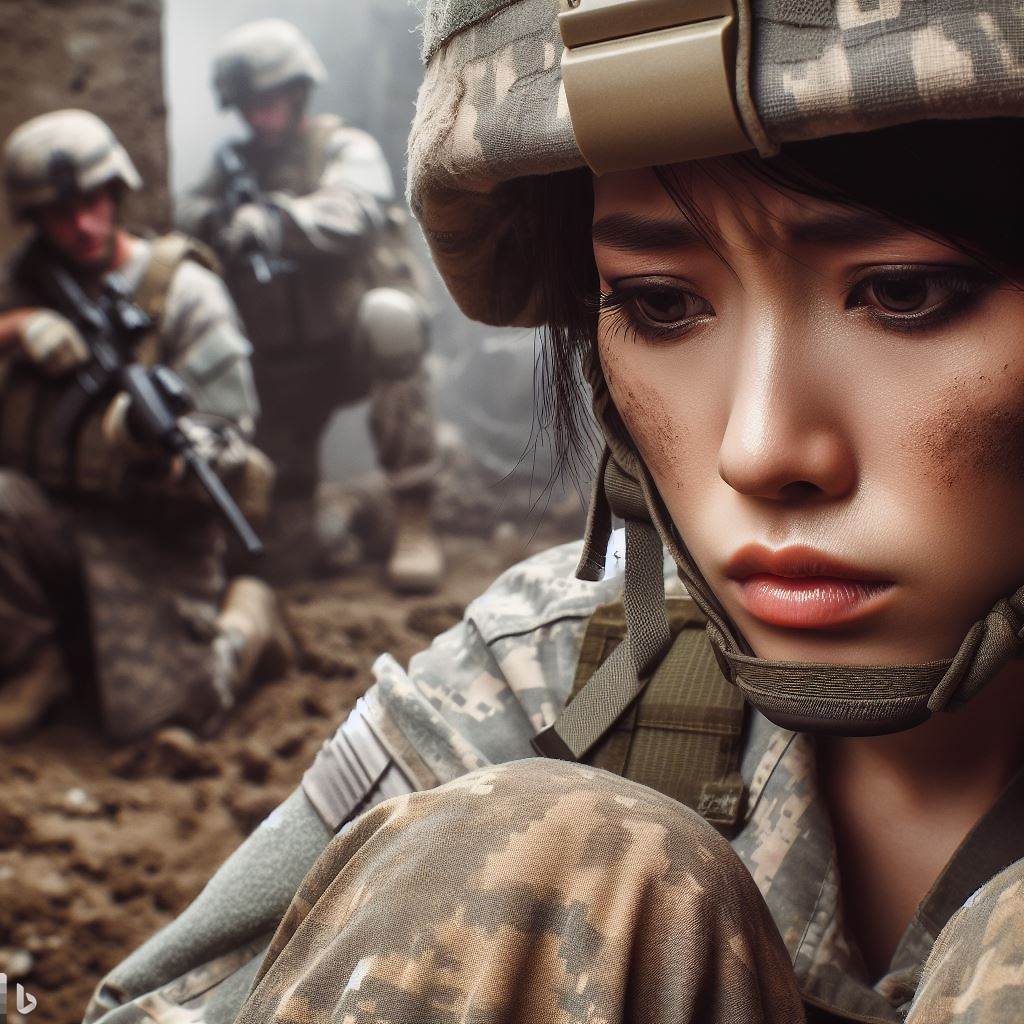Introduction
Overview of the topic
War ethics is crucial as it involves decision-making in combat zones.
Delving into the intricate realm of the ethics of war becomes imperative when examining decision-making within the chaotic landscapes of combat zones.
Importance of discussing the ethics of war and decision making in combat zones
The significance of discussing the ethics of war and decision-making in combat zones goes beyond mere academic curiosity.
This introductory section seeks to shed light on the multifaceted nature of this critical topic:
- Raising Awareness: By initiating conversations about the ethical dilemmas faced by soldiers, we contribute to a broader understanding of the challenges they confront on the battlefield.
- Analyzing ethical decisions in combat reveals their broad impact, affecting both combatants and innocent civilians caught in the crossfire.
- Promoting Responsible Conduct: Engaging in a discourse on the ethical aspects of war decision-making serves as a call to action, encouraging responsible and conscientious conduct during armed conflicts.
Embarking on this exploration is more than an intellectual exercise—it’s a societal responsibility to comprehend and address the ethical considerations that underpin decision-making in the theatre of war.
Understanding the Ethics of War
Definition of ethics in the context of war
- Ethics in war refers to the moral principles and values that guide decision making in combat zones.
- It involves determining what is right and wrong, just and unjust, in the midst of conflict.
- This ethical framework helps soldiers navigate the complexities of war and maintain their humanity.
- It focuses on minimizing harm, protecting civilians, and upholding international laws and conventions.
Historical perspectives on the ethics of war
- Throughout history, cultures and societies have grappled with the morality of warfare.
- Ancient civilizations developed codes of conduct, such as chivalry and honor, to regulate warfare.
- The Geneva Conventions in the 20th century established legal standards for the treatment of prisoners and civilians.
- These historical perspectives shape contemporary discussions on the ethics of war.
Different ethical theories and their application in combat situations
- Utilitarianism: Decisions are based on maximizing overall happiness and minimizing suffering.
- Just War Theory: War can be justified under certain conditions, such as self-defense or protecting innocent lives.
- Kantian Ethics: Actions are guided by a sense of duty and respect for the inherent worth of individuals.
- Virtue Ethics: Ethical behavior is cultivated through the development of virtuous traits within individuals.
The application of these theories depends on the specific context and circumstances of each combat situation.
Soldiers must consider the potential consequences and moral implications of their actions.
They are faced with difficult decisions that require balancing military objectives with ethical considerations.
In the heat of battle, rapid decision-making and judgment can have life-altering consequences.
Training and education play a crucial role in preparing soldiers to make ethical choices in combat zones.
Read: Financial Planning for U.S. Military Personnel & Families
Decision Making in Combat Zones
Challenges and complexities of decision making in combat
- Pressure to make split-second decisions amidst chaos and danger.
- Balancing the need for self-preservation with the duty to protect others.
- Dealing with limited information and uncertainty in rapidly evolving situations.
- Recognizing and overcoming cognitive biases that may cloud judgment.
- Maintaining a moral compass in the face of conflicting values and interests.
Factors influencing decision making
1. Moral considerations
Deciding between actions that harm others and actions that minimize harm.
2. Legal obligations
Adhering to international laws and conventions governing warfare.
3. Military doctrines and codes of conduct
Following rules and guidelines set forth by the military hierarchy.
4. Personal beliefs and values
Reconciling individual ethics and principles with the reality of combat.
Case studies illustrating ethical decision making in combat zones
- The dilemma of using drones in targeted assassinations.
- Examining the ethical implications of remote warfare and civilian casualties.
- The controversy surrounding civilian collateral damage.
- Evaluating the ethical justifications and accountability for unintended civilian deaths.
- The role of personal values in refusing illegal orders.
- Exploring cases where soldiers stood up against immoral commands.
- The decision to use force to protect oneself or fellow soldiers.
- Analyzing the balance between self-defense and proportionality in combat situations.
- The debate on torture tactics in interrogations.
Examining the ethics and effectiveness of using extreme measures to extract information.
In combat zones, decision making is a complex process with various challenges and factors at play.
Soldiers face immense pressure to make split-second decisions under chaotic and dangerous circumstances.
Challenges, Factors, and Case Studies Shaping Soldier Conduct
The need to balance self-preservation with the duty to protect others adds another layer of complexity.
Limited information and rapidly changing situations further complicate decision making.
Soldiers often have to act based on incomplete data, relying on their training and intuition.
Transform Your Career Today
Unlock a personalized career strategy that drives real results. Get tailored advice and a roadmap designed just for you.
Start NowHowever, cognitive biases can cloud judgment, making it crucial to be aware of and overcome these biases.
Moral considerations play a significant role in decision making, with soldiers having to choose between actions that may harm others and actions that minimize harm.
Adhering to international laws and conventions governing warfare is also an important factor, ensuring that actions are within legal boundaries.
Military doctrines and codes of conduct provide guidelines for decision making in combat zones.
Soldiers are expected to follow these rules and guidelines set forth by the military hierarchy.
However, personal beliefs and values may sometimes conflict with these doctrines, necessitating a careful balancing act.
Case studies can shed light on ethical decision making in combat zones.
The use of drones in targeted assassinations raises questions about the ethics of remote warfare and civilian casualties.
The controversy surrounding civilian collateral damage requires a critical examination of ethical justifications and accountability for unintended civilian deaths.
Personal values come into play when soldiers face illegal orders. Case studies of soldiers refusing immoral commands showcase the importance of individual ethics and principles in combat situations.
The decision to use force to protect oneself or fellow soldiers is another ethical dilemma that must consider both self-defense and proportionality.
One of the most contentious debates revolves around torture tactics in interrogations.
The ethics and effectiveness of extreme measures to extract information are examined closely, weighing the potential benefits against the violation of human rights.
Overall, decision making in combat zones is a complex and morally charged process.
Understanding the challenges, factors, and case studies involved is crucial in fostering ethical decision making among soldiers and promoting accountability in warfare.
Read: Military Technology: Tools of the Modern American Soldier

The Role of Commanders and Leaders
Responsibilities of commanders in ensuring ethical decision making
- Establishing clear ethical guidelines for soldiers to follow
- Communicating the importance of ethical decision making to subordinates
- Holding individuals accountable for unethical actions
- Creating a culture that values ethics and moral behavior
- Providing guidance and support to soldiers facing ethical dilemmas
Training and preparation for ethical decision making
- Providing comprehensive ethics training to soldiers
- Teaching soldiers how to analyze and evaluate ethical dilemmas
- Simulating realistic scenarios that test soldiers’ ethical decision-making abilities
- Teaching soldiers to recognize potential biases or personal interests that may influence their decisions
- Encouraging soldiers to seek consultation and advice from ethical experts
Balancing mission accomplishment with ethical considerations
- Considering the ethical implications of each mission objective
- Weighing the potential harm to civilians or non-combatants against the military necessity
- Seeking alternative approaches that minimize harm while still achieving the mission
- Encouraging open dialogue and discussion among leaders to address ethical concerns
- Providing soldiers with resources and support to cope with ethical challenges and moral injury
Commanders and leaders play a critical role in ensuring ethical decision making in combat zones.
They have various responsibilities to uphold ethical standards and promote a culture that values moral behavior.
By establishing clear guidelines, communicating the importance of ethics, and holding individuals accountable, commanders set a strong foundation for ethical decision making.
Training and preparation are essential in developing soldiers’ ethical decision-making abilities.
Transform Your Career Today
Unlock a personalized career strategy that drives real results. Get tailored advice and a roadmap designed just for you.
Start NowThrough comprehensive ethics training, soldiers learn to analyze and evaluate ethical dilemmas, recognizing potential biases that may influence their decisions.
Simulating realistic scenarios allows soldiers to practice making ethical choices under challenging circumstances.
However, commanders must understand the challenges of balancing mission accomplishment with ethical considerations.
They should carefully consider the potential harm to civilians or non-combatants, seeking alternative approaches that minimize harm while still achieving the mission.
Open dialogue among leaders is crucial in addressing and resolving ethical concerns that may arise.
Lastly, commanders must provide support to soldiers facing ethical challenges and moral injury.
This includes offering resources for coping, such as psychological counseling and guidance from ethical experts.
Acknowledging the emotional toll of ethical decision making can help soldiers navigate complex situations and maintain their mental well-being.
In short, commanders and leaders have a vital role in ensuring ethical decision making in combat zones.
By guiding, training, and balancing mission objectives with ethics, they foster an environment for soldiers to make moral choices in conflict.
Read: U.S. Air Force: Roles, Duties, and Life Above Ground
Moral Injury and Psychological Impact
Definition and explanation of moral injury
Moral injury refers to the psychological distress caused by participating in or witnessing actions that violate one’s moral or ethical beliefs.
Psychological effects of unethical decisions in combat
- Post-traumatic stress disorder (PTSD) is commonly associated with ethical or moral dilemmas faced in combat.
- Feelings of guilt, shame, and self-blame can have profound psychological impacts on individuals involved in unethical decisions.
- Depression and anxiety may arise as a result of the internal conflict caused by moral injury.
- Social isolation and alienation can occur when individuals struggle to reconcile their actions with their moral values.
- Substance abuse and self-destructive behavior may serve as coping mechanisms for those grappling with moral injury.
Strategies for coping with moral injury and providing psychological support
- Encouraging open communication and creating a safe environment for individuals to discuss their moral concerns.
- Providing access to mental health professionals who specialize in treating moral injury and its associated psychological effects.
- Implementing peer support programs that connect individuals who have experienced similar moral dilemmas.
- Including moral and ethical training as part of pre-deployment and in-service education to mitigate the risk of moral injury.
- Fostering a culture of ethical decision-making within the military to reduce the occurrence of morally injurious situations.
- Developing effective coping mechanisms, such as mindfulness practices and self-reflection, to help individuals manage moral distress.
- Creating opportunities for psychological debriefing and processing of moral dilemmas after combat experiences.
- Facilitating community reintegration and support to help individuals rebuild their lives and find meaning after moral injury.
In general, moral injury and its psychological impact are critical issues in the context of decision-making during combat.
Recognizing moral injury, understanding its psychological impact, and implementing coping strategies are crucial for promoting military personnel’s well-being.
Read: Adapting to Civilian Life: Tips for Returning Veterans
Accountability and Justice
Importance of accountability in combat situations
- Accountability plays a crucial role in maintaining ethical conduct in combat zones.
- It ensures that individuals are held responsible for their actions and decisions.
- By promoting accountability, trust and discipline can be maintained within military units.
- It acts as a deterrent, discouraging unethical behavior and promoting adherence to rules.
- Accountability also fosters a sense of justice, which is essential for maintaining order and morale.
Legal mechanisms and systems for addressing unethical behavior
- International laws and conventions provide a framework for addressing unethical behavior during warfare.
- The Geneva Conventions, for example, establish rules and guidelines for the treatment of prisoners of war.
- Military courts and tribunals aim to ensure due process and fair trials for military personnel accused of misconduct.
- Commanding officers play a critical role in enforcing accountability and addressing unethical behavior within their units.
- Legal mechanisms serve as a mechanism for justice and can deter future unethical behavior in combat situations.
Challenges in achieving justice in complex combat environments
- Combat situations are often characterized by chaos, making it challenging to gather evidence and establish accountability.
- The fog of war can sometimes lead to confusion and errors in judgment, making it difficult to determine ethical responsibility.
- The presence of non-state actors and unconventional warfare tactics further complicate the achievement of justice.
- Additionally, combat environments may have limited resources and infrastructure to conduct thorough investigations.
- Cultural and legal differences between the parties involved can also hinder the achievement of justice in combat situations.
Navigating Accountability and Justice Challenges for Military Personnel
Ensuring accountability and justice in combat zones is crucial for upholding ethical conduct and maintaining the trust and morale of military personnel.
Accounting for individual actions and decisions through legal mechanisms helps deter unethical behavior and promote adherence to international laws and conventions.
The importance of accountability cannot be overstated as it promotes discipline, order, and trust within military units.
Additionally, legal mechanisms such as military courts and tribunals ensure that due process and fair trials are conducted, safeguarding the rights of individuals accused of misconduct.
However, achieving justice in complex combat environments presents significant challenges.
Transform Your Career Today
Unlock a personalized career strategy that drives real results. Get tailored advice and a roadmap designed just for you.
Start NowThe chaotic nature of combat situations, characterized by the fog of war and unconventional tactics, makes it difficult to establish clear accountability.
Gathering evidence becomes a formidable task, and errors in judgment can occur due to the circumstances.
Moreover, limited resources and infrastructure in combat zones can hinder thorough investigations, delaying the delivery of justice.
Cultural and legal differences among involved parties further complicate the process.
Overcoming these challenges requires constant evaluation and adaptation of legal mechanisms to ensure justice is upheld.
In fact, accountability and justice are indispensable principles in combat zones.
They foster trust, discipline, and adherence to ethical standards.
Legal mechanisms and systems provide a framework to address unethical behavior, while challenges in complex combat environments necessitate ongoing efforts to achieve justice.
By ensuring accountability and justice, we can strive for a more ethical conduct in warfare.
Conclusion
Recap of key points
Throughout this blog section, we have delved into the ethics of decision-making in combat zones.
We explored the complexities and challenges faced by soldiers in wartime.
Significance of ethical decision-making in combat zones
It is crucial to understand the importance of ethical decision-making in war.
These decisions can have far-reaching consequences, not only for the individuals involved but also for society as a whole.
Call to action for promoting ethical behavior in war
We must strive to promote ethical behavior in combat zones.
This can be achieved through better training programs, fostering a culture of moral responsibility, and holding individuals accountable for their actions.
In summary, the ethics of decision-making in combat zones is a critical and complex topic.
It requires a deep understanding of the ethical challenges faced by soldiers and the implications of their choices.
By promoting ethical behavior, we can hope to mitigate the negative impact of war on both soldiers and society.
It is our collective responsibility to work towards a world where ethical decision-making guides our actions in times of conflict.
[E-Books for Sale]
The Big Book of 500 High-Paying Jobs in America: Unlock Your Earning Potential
$19.99 • 500 High-Paying Jobs • 330 pages
Explore 500 high-paying jobs in America and learn how to boost your career, earn more, and achieve success!
See All 500 High-Paying Jobs of this E-Book
1001 Professions Without a Degree: High-Paying American Jobs You Can Start Now
$19.99 • 1001 Professions Without a Degree • 174 pages
Discover 1001 high-paying jobs without a degree! Unlock career tips, skills, and success strategies for just $19.99!




